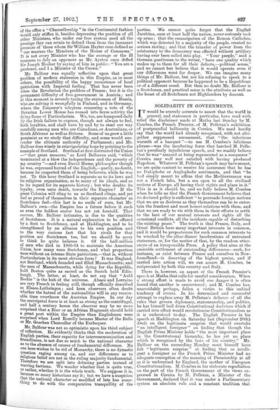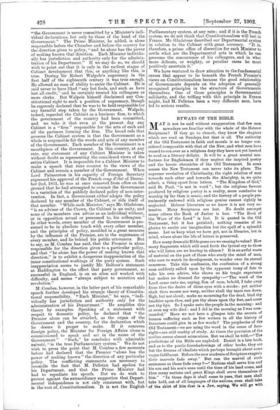SOLIDARITY IN GOVERNMENTS.
IT would be scarcely accurate to assert that the world in general, and statesmen in particular, have read with relief the disclaimer made at Matha last Sunday by M. Combos, the French Premier, of M. Pelletan's exhibition of postprandial bellicosity in Corsica. We need hardly say that the world had already recognised, with not alto- gether suppressed amusement, that " the infectious warmth of a banquet "—to use M. Combes's felicitous phrase—was the incubating force that hatched M. Pelle- tan's peculiarly injudicious speech, and we readily believe that he was " amazed at being represented as a conqueror." Corsica may well rest satisfied with having produced Napoleon. Whatever M. Pelletan's speech may have meant, we are quite content to receive his assurance that he has no Italophobe or Anglophobe sentiments, and that " he had simply meant to affirm that the Mediterranean was not a French lake, but a sea open to all the civilised nations of Europe, all having their rights and place in it." This is as it should be, and we fully believe M. Combos when he tells us that the French Government believes that its declared policy is sufficient " to persuade foreign nations that we are as desirous as they themselves can be to enter- tain the frankest and most honest relations with them, and that we are ready to vie with them in their efforts to settle to the best of our mutual interests and rights all the occasional conflicts, all the incidents capable of disturbing the existing peace." The truth is that France, Italy, and Great Britain have many important interests in common, and it would be preposterous for such common interests to be wrecked by the after-dinner lucubrations of untrained statesmen, or, for the matter of that, by the random utter- ances of an irresponsible Press. A policy that aims at the amicable settlement of outstanding differences—such, for instance, as exist between France and ourselves in New- foundland—is deserving of the highest praise, and if carried into action will, we can assure M. Combos, be reciprocated by both this country and Italy.
There is, however, an aspect of the French Premier's speech at Matha that calls for careful consideration. When a strong effort is made to avoid one danger it is often found that another is encountered ; and M. Combos has, unavoidably perhaps, fallen a victim to this unkind tendency of events. In his determined and successful attempt to explain away M. Pelletan's defiance of all the rules that govern diplomacy, statesmanship, and politics, he has himself laid down Constitutional doctrines which if carried into effect would revolutionise Constitutionalism as it is understood to-day. The English Premier in his speech at Haddington on Saturday last (September 20th) dwelt on the legitimate surprise that would overtake " an intelligent foreigner " on finding that though the English Prime Minister holds " the most important place in the Constitutional hierarchy, he has yet no place which is recognised by the laws of his country." Mr. Balfour on the succeeding Monday must himself have felt " legitimate surprise " at finding that so intelli- gent a foreigner as the French Prime Minister had no adequate conception of the meaning of Premiership at all as it is understood by England, the mother of European Constitutionalism. M. Combos in his elaborate repudiation on the part of the French Government of the views ex- pressed in Corsica, by M. Pelletan, a Minister of the Government, declared that it was under a Parliamentary system an absolute rule and a constant tradition that any harmful step taken by the Government. Walpole, indeed, regarded the Cabinet as a business firm, to which the government of the country had been committed, BYWAYS OF THE BIBLE.
Cabinet is a "firm " responsible for the acts of each and all the partners forming the firm. The broad rule that governs the Cabinet system is that the Government as a whole is responsible for the words and acts of any member sumed to be in absolute touch with every other member,
and the principles of policy, moulded in a great measure g
by the influence of the Premier, are in the cognisance of every member, and lie behind his public utterances. But to say, as M. Combes has said, that the Premier is alone How many dramatic Bible gems are we ceasing to valueP How
responsible for the direction given to a particular policy, many fragments which still send forth the lyrical cry to those and that " he alone has the power of making known that who will listen are we leaving in silence P It is an awful waste direction," is to exhibit a dangerous inappreciation of the of material on the part of those who study the mind of man, inner constitutional workings of the party system. Such who care to watch its development, to wonder over its eternal inappreciation seems to justify Mr. Balfour's statement sameness. Take this confession, the confession of a strong at Haddington to the effect that party government, so man suddenly called upon by the apparent irony of fate to successful in England, is on an alien soil worked with take his own advice, who shows us his tragic experience difficulty, and seems " always subject to mutation and but makes no demand for sympathy :—" The word of the
revolution." Lord came unto me, saying, Son of man, behold, I take away
M. Combes, however, in the latter part of his remarkable from thee the desire of thine eyes with a stroke : yet neither speech further developed his strange theory of Constitu- shalt thou mourn nor weep, neither shall thy tears run down. tional responsibility. " Each Minister," he says, " indi- Sigh, but not aloud; make no mourning for the dead, bind thy vidually has jurisdiction and authority only for the headtire upon thee, and put thy shoes upon thy feet, and cover administration of his Department." He amplifies this not thy lips. So I spake unto the people in the morning : and theory by examples. Speaking of a statement with at even my wife died : and I did in the morning as I was com- re.spect to domestic policy, he declared that " the mantled.. Have we not here a glimpse into the secrets of Premier alone can be attacked, as the organ of the human suffering such as few writers in all the history of Government and the country, for the declaration which literature could give in as few words? The prophecies of the he deems it proper to make. If it concerns Old Testament—we are using the word in the sense of fore-
foreign policy, the Minister for Foreign Affairs alone is commissioned to speak and act in the name of the
Government." " Such," lie concludes with admirable scribes seems almost miraculous. But we shall be told,—" The naivettS, " is the true Parliamentary system." We do not predictions of the Bible are exploded. Daniel is a late book, wish to press the point that M. Combes a few moments and as to the poetic foreshadowings of other books, they are before had declared that the Premier "alone has the but the dreams of idealists which perhaps brought about some power of making known " the direction of any particular vague fulfilment. Before the new students of Scripture exegesis policy. The conflicting statements are necessary to their marvels fade away." But can the marvel of such reconcile the fact that M. Pelletan had spoken for sentences as these fade away P—" Nations shall serve him and his Department, and that the Prime Minister had his son and his son's sons until the time of his land come, and had to repudiate his speech. But we do wish to then many nations and great Kings shall serve themselves of protest against the extraordinary suggestion that Depart- him." "In those days it shall come to pass, that men shall mental independence is not only consistent with, but take hold, out of all languages of the nations, even shall take is the root of, Constitutionalism. It is not the English of the skirt of him that is a Jew, saying, We will go with "the Government is never committed by a Minister's indi- Parliamentary system, at any rate; and if it is the French vidual declarations, but only by those of the head of the system, we do not think that Constitutionalism will last in 'Government." The Prime Minister, he added, is alone France. Mr. Gladstone described our Departmental system responsible before the Chamber and before the country for in relation to the Cabinet with great accuracy. "It is, the direction given to policy, " and he alone has the power therefore, a prime office of discretion for each Minister to of making known that direction. Each Minister individu- settle what are the Departmental acts in which he can ally has jurisdiction and authority only for the adminis- presume the concurrence of his colleagues, and in what tration of his Department." If we may do so, we should more delicate, or weighty, or peculiar cases he must wish to point out that it is only in the earliest stages of positively ascertain it."
Cabinet development that this, or anything like this, is We have ventured to draw attention to the fundamental true. During Sir Robert Walpole's supremacy in the errors that appear to lie beneath the French Premier's first half of the eighteenth century it was true enough. views on Constitutionalism because the good relationship He allowed no man of ability to enter the Cabinet. He is of Governments depends on the adoption of generally said never to have liked " any but fools, and such as have recognised principles in the structure of Governments lost all credit," and he certainly treated his colleagues as themselves. One of those principles is Governmental mere clerks. But Walpole himself disclaimed any Con- solidarity, and the trifling with this principle in France stitutional right to such a position of supremacy, though might, had M. Pelletan been a very different man, have he expressly declared that he was to be held responsible for led to serious results.











































 Previous page
Previous page